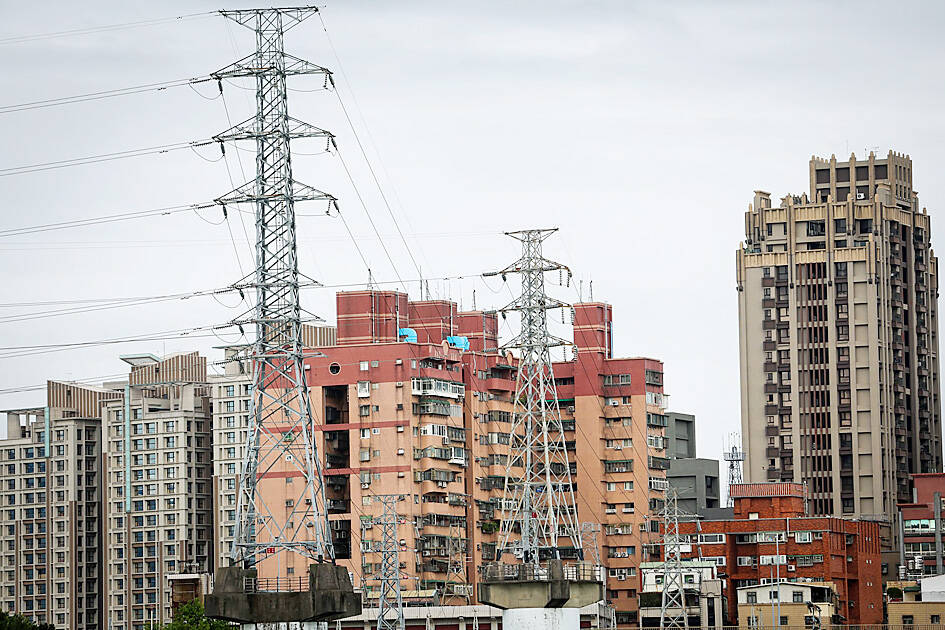Taiwan Power Co (Taipower, 台電) yesterday said it has no plans to increase electricity rates amid speculation that the state-run utility company might push rates higher for a third consecutive year this year.
The speculation was based on Taipower having posted NT$382 billion (US$12.15 billion) in accumulated losses as of the end of last year after incurring losses of NT$198.5 billion in the same year.
The Ministry of Economic Affairs’ electricity price review committee is scheduled to meet in March to decide on rates for the next six months at a critical moment when Taipower grapples with higher fuel prices and ballooning losses.

Photo: CNA
Taipower yesterday denied that an electricity price adjustment plan is in the making.
“The company is conducting an internal financial review and will report to the Ministry of Economic Affairs afterward,” Taipower said in a statement. “The company hopes to gain financial support from the government, as it is tasked with fighting inflation.”
The company last year received NT$150 billion in capital and an electricity subsidy of NT$50 billion from the government, with an additional capital injection of NT$100 billion planned for this year to help reinforce its financial health, the ministry said.
Taipower raised electricity rates by 8.4 percent on average in 2022 and 11 percent on average last year in the wake of surging international fuel costs due to the impact of Russia’s war in Ukraine, although the hikes mainly affected industrial consumers, namely high-voltage and ultra-high-voltage electricity users, with more than 90 percent of users seeing their power price freeze.
During the last meeting in September last year, the electricity price review committee decided to maintain power rates at an average of NT$3.1154 per kilowatt-hour for the next six months, effective from October last year to March this year, despite higher charges of between 10 and 17 percent for heavy users.
Separately, industrial users consuming over 20,000m3 of water per day must obtain at least half of their supply from reclaimed sources beginning on Feb. 1, the Water Resources Agency said yesterday.
Industrial users who have difficulty obtaining reclaimed water in their area can retrieve and treat wastewater not yet discharged into the sewer system for reuse, or exchange water sources with existing businesses within the same water supply area, the agency said, citing new regulations.
Additional reporting by CNA

When an apartment comes up for rent in Germany’s big cities, hundreds of prospective tenants often queue down the street to view it, but the acute shortage of affordable housing is getting scant attention ahead of today’s snap general election. “Housing is one of the main problems for people, but nobody talks about it, nobody takes it seriously,” said Andreas Ibel, president of Build Europe, an association representing housing developers. Migration and the sluggish economy top the list of voters’ concerns, but analysts say housing policy fails to break through as returns on investment take time to register, making the

‘SILVER LINING’: Although the news caused TSMC to fall on the local market, an analyst said that as tariffs are not set to go into effect until April, there is still time for negotiations US President Donald Trump on Tuesday said that he would likely impose tariffs on semiconductor, automobile and pharmaceutical imports of about 25 percent, with an announcement coming as soon as April 2 in a move that would represent a dramatic widening of the US leader’s trade war. “I probably will tell you that on April 2, but it’ll be in the neighborhood of 25 percent,” Trump told reporters at his Mar-a-Lago club when asked about his plan for auto tariffs. Asked about similar levies on pharmaceutical drugs and semiconductors, the president said that “it’ll be 25 percent and higher, and it’ll

CHIP BOOM: Revenue for the semiconductor industry is set to reach US$1 trillion by 2032, opening up opportunities for the chip pacakging and testing company, it said ASE Technology Holding Co (日月光投控), the world’s largest provider of outsourced semiconductor assembly and test (OSAT) services, yesterday launched a new advanced manufacturing facility in Penang, Malaysia, aiming to meet growing demand for emerging technologies such as generative artificial intelligence (AI) applications. The US$300 million facility is a critical step in expanding ASE’s global footprint, offering an alternative for customers from the US, Europe, Japan, South Korea and China to assemble and test chips outside of Taiwan amid efforts to diversify supply chains. The plant, the company’s fifth in Malaysia, is part of a strategic expansion plan that would more than triple

Taiwanese artificial intelligence (AI) server makers are expected to make major investments in Texas in May after US President Donald Trump’s first 100 days in office and amid his rising tariff threats, Taiwan Electrical and Electronic Manufacturers’ Association (TEEMA, 台灣電子電機公會) chairman Richard Lee (李詩欽) said yesterday. The association led a delegation of seven AI server manufacturers to Washington, as well as the US states of California, Texas and New Mexico, to discuss land and tax issues, as Taiwanese firms speed up their production plans in the US with many of them seeing Texas as their top option for investment, Lee said. The